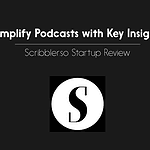In the midst of the hustle and bustle of daily life, where the noise of politics is often drowned out by the media’s soundbites, French citizens seek a better understanding of the institution that influences their lives: the National Assembly. While many struggle to keep up with the fast pace of legislative changes, the intricate world of politics often leaves them feeling confused and longing for transparency.
Enter OpenCitizen, a way to clarify the foggy political landscape. This AI-powered Education/News app doesn’t just skim the surface of parliamentary proceedings; it delves deep, offering unbiased, weekly IA summaries of bills of law. The twist? Users review the content without knowing the author, only discovering the elected official behind it post-analysis. This approach not only strips away preconceived notions but also equips users with analytics on their political preferences, issue by issue.
The brainchild of Georges Raybaud, a solopreneur with a vision, OpenCitizen transforms the possibility of informed democracy into a palpable opportunity. By harnessing AI and data analytics, this platform empowers French citizens to bypass sensationalist media and engage directly with the pulse of their parliament.
With an interview revealing the startup’s journey, let’s uncover how OpenCitizen is reshaping the way French democracy is experienced.
What is OpenCitizen?
OpenCitizen is a digital compass guiding French citizens through the often opaque proceedings of their National Assembly. It’s an AI-powered Education/News app that demystifies weekly parliamentary updates, offering unbiased summaries of bills of law. Users can objectively analyse legislative content without any initial knowledge of the authors, later uncovering the elected official behind each bill. This unique feature fosters a transparent evaluation of political stances, free from the influence of party reputations or media bias.
The service caters to those eager for a direct line to the heart of French politics—individuals who prefer raw insights over sensationalist news. OpenCitizen addresses the challenge many face in staying abreast of legislative developments, cutting through the complexity to provide clear, actionable summaries. It stands out by equipping its users with analytics that reveal their political leanings on various issues, from environmental policies to economic reforms.
Unlike other civic tech initiatives that may rely on surveys or polls, OpenCitizen connects users directly with the substance of political action, fostering a more informed and engaged citizenry. Its approach is not about competing with other platforms but rather offering a distinct, educational perspective on the democratic process. This commitment to fostering informed engagement sets OpenCitizen apart in the landscape of political education tools.
OpenCitizen Founders
Georges Raybaud is not your typical entrepreneur. With a background steeped in strategy consulting at Bain & Co and an illuminating stint in Paris’ largest lobbying firm, Georges brings a unique blend of analytical prowess and a deep understanding of the democratic process. His venture, OpenCitizen, stems from a profound realization during his early career experiences: the true essence of lobbying as a democratic exercise and the power of informed citizenry in shaping governance.
Having witnessed the disconnect between the National Assembly’s actions and the French public’s awareness, Georges identified a critical gap. He noted that the common citizen was often left out of the conversation, their democracy feeling distant and inaccessible. This sparked the idea for OpenCitizen, an app designed to cut through the media noise and deliver unvarnished legislative updates directly to the people.
The inception of OpenCitizen was a journey of resilience and innovation. Georges embraced the challenge head-on despite lacking technical expertise in app development. Leveraging no-code tools like Bubble and Xano and tapping into the power of OpenAI’s technologies, he single-handedly crafted a platform in less than four months. The iterative process, fueled by feedback from beta users, refined the user experience and explored various monetization strategies. Today, the app is a testament to Georges’ dedication to simplifying the complex world of French politics for the average citizen.
The spark ignited Georges’ entrepreneurial spirit was his desire to empower citizens to seek information directly from the source, bypassing the often sensationalist and polemic media coverage. OpenCitizen is his answer to the public’s yearning for a transparent and direct engagement with their political system. Through AI-generated summaries of bills and analytics on political preferences, Georges has set out to redefine the way democracy is experienced in France.
Interview with Georges Raybaud, Founding Citizen of OpenCitizen
OpenCitizen, with its AI-driven approach, promises to bridge the gap between the National Assembly’s proceedings and the public’s understanding. Georges Raybaud, a strategist turned democratic crusader, is the mastermind behind this revolutionary platform.
I had the unique opportunity to candidly talk with Georges, getting into the genesis of OpenCitizen and his vision for a more informed and active electorate. Here’s a glimpse into our dialogue:
Q: Georges, could you give us a brief overview of what OpenCitizen is all about?
A: OpenCitizen is an AI-powered Education/News app designed to provide French citizens with unbiased summaries of bills of law from the National Assembly. It’s a tool that allows users to review legislative content without preconceived notions about the authors, fostering objective analysis. After engaging with the material, users can discover which elected official is behind each bill, thus promoting transparent political understanding.
Q: Who do you envision as the primary users of OpenCitizen?
A: Our target audience includes French citizens interested in politics or democracy, particularly those who desire to cut through the complexity of parliamentary proceedings. We aim to serve individuals seeking a straightforward, factual account of legislative developments.
Q: How does OpenCitizen address the issue of opacity in the National Assembly’s activities?
A: We cut through the opacity by offering weekly IA summaries of bills of law that include the main changes and context without disclosing who wrote them. This allows users to form opinions based on content rather than political affiliation. Subsequently, users can access detailed analytics to understand their political preferences and discover which elected officials and political groups align with their views on various topics.
Q: Tell us about the journey of founding OpenCitizen.
A: I embarked on this venture as a solopreneur with no prior technical expertise in app development. Using no-code tools and AI technologies, I was able to create the platform from scratch in under four months. Through iterative design and user feedback, I refined the user experience and explored monetization strategies. We’re focused on enhancing our SEO and PR to create a positive feedback loop for user acquisition.
Q: What sets OpenCitizen apart from other civic tech initiatives?
A: Unlike other civic tech startups that often rely on surveys or polls, OpenCitizen connects users directly with the substance of political action. Our approach is not to say ‘your voice matters’ through polls with little impact but to inform and empower citizens to understand and engage with the legislative process themselves.
Q: Can you share some insights into your startup’s current performance and future plans?
A: Currently, we have a modest user base with a subscription-based revenue model. Our immediate goal is to grow our audience and foster a community of French citizens who can leverage the app to organize and influence the political landscape, much like large corporations and NGOs.
Q: Finally, what advice would you offer to aspiring entrepreneurs?
A: Resilience is key. Maintain a sustainable lifestyle, look after your well-being, and persist in your endeavours. Expect challenges, learn from setbacks, and celebrate every success, no matter how small. Consider a side gig to support your venture financially. Remember, the skills and experiences you gain as an entrepreneur are invaluable, regardless of the outcome.
Georges Raybaud’s journey with OpenCitizen reflects the entrepreneurial spirit and a deep commitment to revitalizing citizen engagement in French democracy. His insights offer a compelling narrative for anyone looking to make a tangible impact through technology and informed participation.
Feedough’s Take on OpenCitizen
OpenCitizen is a breath of fresh air in the civic tech space. It’s a game-changer for French democracy, offering a practical solution for those seeking to cut through the noise and get to the heart of political matters. Using AI to provide unbiased legislative summaries is a smart move, ensuring that citizens can form their own opinions without being swayed by party lines or media spin.
The potential for OpenCitizen to disrupt the traditional flow of political information is significant. Equipping citizens with knowledge and analytics on their political preferences empowers them to become active participants in their democracy, not just passive observers.
Looking ahead, OpenCitizen’s challenge will be scaling its user base and maintaining the quality of its summaries as the political landscape evolves. Yet, with a clear value proposition and a commitment to transparency, it’s well-positioned to meet these challenges head-on.
Expect to see OpenCitizen play a pivotal role in fostering a more informed and engaged electorate. It’s a shining example of how technology can enhance democracy, and it’s just getting started.
A startup consultant, digital marketer, traveller, and philomath. Aashish has worked with over 20 startups and successfully helped them ideate, raise money, and succeed. When not working, he can be found hiking, camping, and stargazing.









